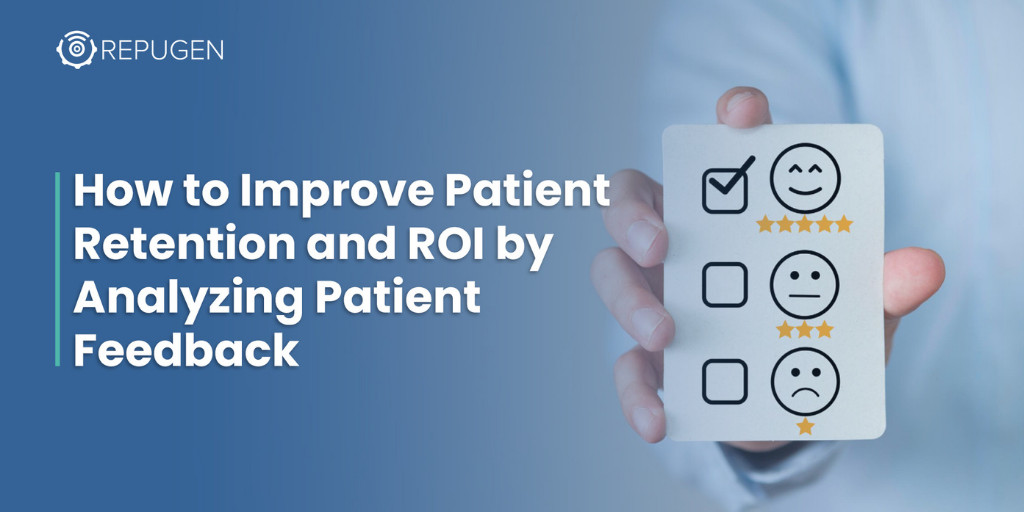
Since 73% of perspective of prospective patients check reviews before selecting a healthcare provider, online reputation can be a patient’s deciding factor between you and your competitors. However, utilizing reviews and feedback go far beyond simply soliciting them from patients. A solid foundation of positive reviews must be paired with proper analysis, which can increase your practice’s revenue.
By collecting and analyzing patient reviews and feedback, you can develop and implement new strategies that result in increased patient acquisition, retention, and satisfaction. In fact, a study from Harvard Business Review shows that a 1-star rating improvement in online reviews equates to a 5-9% increase in revenue. In fact, positive reviews have even been shown to be tied to increased hospital revenue. Keep patients satisfied, and they spread the word that your practice is the one to choose.
"Patient feedback and reviews play a vital role in shaping the quality of care provided at our practice. Whether it's adjusting our communication approach, enhancing our pre- and postoperative care protocols, or refining our surgical techniques, patient input guides our continuous efforts to deliver exceptional results and experiences "
This article will walk you through the value of patient loyalty, how to analyze patient feedback, and using sentiment analysis to find out your patients’ emotions.
Improving patient satisfaction improves patient loyalty, which then can increase your practice’s revenue. Give your patients a great experience, and they are more likely to return for their future needs as well as refer their friends and family.
Improving patient loyalty and decreasing patient turnover can significantly increase your practice’s revenue and ROI. With Americans having over $10,000 to spend on healthcare per year, they have the freedom to choose among many providers for their needs. So, it’s important to establish yourself as the go-to practice for your community’s healthcare needs.
Additionally, it’s no secret that retaining patients costs significantly less than acquiring new ones. In fact, Nurturing your current patient relationships can greatly pay off in many ways for your practice. It has also been found that Increasing patient retention by just 5% can increase a practice’s profits by up to 95%.
While 5-star reviews may draw a new patient in initially, it’s important to take the extra steps to analyze reviews and use the feedback to strengthen patient satisfaction and loyalty to your practice.
Two ways to effectively analyze and understand patient reviews are by using sentiment and word cloud analysis.
Patient sentiment analysis is a process of analyzing patient feedback to determine the emotions, opinions, and attitudes being expressed about your practice. This unique strategy can give you a competitive edge over your competition, since you are diving into the psychology behind your patients’ thoughts.
"Leveraging patient feedback transformed our healthcare practice by directly improving our online appointment-booking system. After noticing patient frustrations with the system's complexity and unreliability, we used the software as a patient would, pinpointing key drawbacks. Collaborating with IT, we simplified the user interface and fixed backend slowdowns, significantly enhancing usability and reliability. This change, coupled with targeted SEO strategies emphasizing 'easy online booking,' not only reduced negative feedback but simultaneously increased positive reviews and online appointments. Highlighting our patient-centered improvements in marketing and on our website showcased our commitment to responsive care, boosting patient satisfaction and our practice's digital visibility "

Sentiment analysis software can compile all internal patient feedback as well as crawl Google, Yelp, Facebook, Twitter, and other aspects of the web to find reviews and information that mentions your practice to give you an easier method to analyze all of your patient feedback. By understanding what patients are feeling about their experience with your practice, you can identify gaps and implement any corrective measures necessary.
The benefits of sentiment analysis include:
Sentiment analysis can help healthcare providers identify areas that they excel or fail in when it comes to patient satisfaction. After the analysis is run, management can then use the results collected to find out the most common complaints or accolades, segment the information based on doctors or departments, and other parameters to identify opportunities for patient care improvement.
A great example of this would be RepuGen’s AI-powered sentiment analysis tool as it retrieves patient feedback and compiles it in an easy portal for healthcare professionals to view. This software can also classify patient comments into processes, places, and people, and then assign them various scores to uncover what patients feel about various aspects of your facility.
A word cloud analysis is a tool to show how often certain words or phrases are mentioned in reviews. This is a simple way to see the most mentioned topics revolving around your practice, which can provide new insight on how patients feel about your practice and help to identify any problem areas or common complaints.
For example, if your healthcare practice’s word cloud shows that the top three phrases mentioned in your reviews are “long wait times, “hard to find,” and “unfriendly staff,” you can develop strategies to fix these problem areas and begin to improve upon to elevate patient satisfaction. The specificity that comes with a word cloud analysis allows you to develop targeted plans that are easily measurable.
"Actively soliciting and analyzing this feedback helps identify how services can become more patient-centered, such as by reducing wait times and enhancing communication between patients and healthcare providers. Streamlining the appointment-scheduling process based on patient suggestions has significantly cut down wait times, leading to an uptick in patient satisfaction "

On another note, word clouds can also show what patients value about their experience at your practice. For example, your word cloud might show that patients are reviewing your practice with words and phrases such as, “listens well,” “kind doctor,” and “friendly staff.” Now, you know your strengths and can implement any new strategies or changes with these in mind for optimal practice performance.
Healthcare practices should be proactive in both collecting and analyzing patient reviews to learn what their patients are saying about them. But by using sentiment analysis technology and word cloud tools, those healthcare practices gain the ability to analyze their patient feedback in a more in-depth and effective manner, thus allowing them to elevate their patients’ experiences, boost patient retention, improve their revenue, and enhance overall business operations.
0 Comment
Your email address will not be published. Required fields are marked *